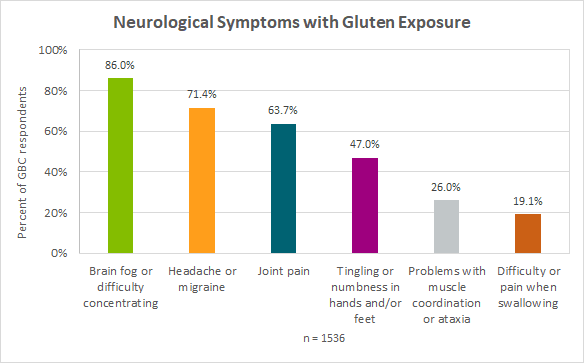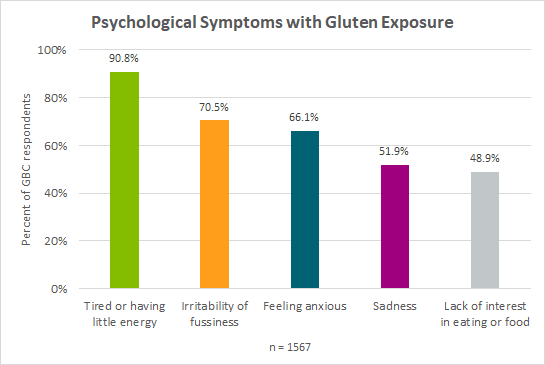
By Kate Avery, MPH, Director of Research and Patient Engagement
The patient voice is begging to be heard in celiac disease. People with celiac disease often report highly varied presentations of their disease—and they want doctors and scientists to listen to their real experiences living with this genetic autoimmune disorder.
Despite there being over 300 symptoms of celiac disease, many doctors still only focus on gastrointestinal (GI) manifestations such as abdominal pain, bloating and diarrhea when diagnosing and treating a patient. In research, it’s often the same, with GI symptoms getting far more attention. These are typically the only symptoms measured in clinical trials as a test of whether or not the drug is working as it is supposed to in celiac disease patients.
While many may present these “classic GI symptoms” of celiac disease, many others may not experience any. Instead, they may complain of symptoms such as joint pain, anxiety or debilitating rashes. This makes celiac disease difficult to diagnose, especially since many doctors are unaware or even questioning of the non-GI manifestations of this disease. However, new data is showing that doctors and researchers should be paying attention to what their celiac disease patients are actually experiencing versus what they expect them to experience.
Recent data from the Go Beyond Celiac Gluten Exposure Survey highlights a number of neurological and psychological symptoms that celiac disease patients report experiencing after exposure to gluten, adding to the call that patients truly experience more than just GI troubles.
Go Beyond Celiac, a research database created by Beyond Celiac, collects patient-reported data about people’s experiences before, during and after their diagnosis. In the Gluten Exposure Survey, Beyond Celiac aimed to learn about what symptoms participants actually experience after ingesting gluten. Around 1,500 participants filled out the survey with eye-opening information, with many of the survey answers focusing on neurological and psychological symptoms.
Neurological manifestations of celiac disease relate to symptoms affecting the nervous system.
The following graph shows the percentage of Go Beyond Celiac participants who reported each of the neurological symptoms with gluten exposure:

The most commonly reported symptom was brain fog, with 86% of the participants saying they had brain fog or difficulty concentrating. Brain fog is a feeling that the processes of thinking, understanding, and remembering are not working as they should. In 2019, Beyond Celiac presented a paper at the International Celiac Disease Symposium about the impact of brain fog, which highlighted the cognitive burden of celiac disease. The findings of the Go Beyond Celiac Gluten Exposure survey provide further insight on the amount of celiac disease patients experiencing this symptom.
The second most common neurological symptom reported was headaches or migraines, with 71.4% of participants experiencing this symptom. This adds further data to a 2018 study showing that adults with celiac disease were 2.7 times as likely to have headaches as adults without celiac disease.
Rounding out the top three was joint pain, with 63.7% reporting this symptom. For all three of these neurological symptoms, over 60% of Go Beyond Celiac participants reported having them, suggesting that they are quite common.
Tingling or numbness in the hands and/or feet (also known as peripheral neuropathy) was reported by 47% of participants. Less commonly reported symptoms were problems with muscle coordination (also called ataxia), with 26% of participants and difficulty or pain when swallowing, with 19.1% of participants.
There are also psychological symptoms of celiac disease. The following graph shows the percentage of Go Beyond Celiac participants who reported each symptom with gluten exposure:

Over 90% of participants reported that they feel tired after exposure to gluten. This is the most common of the non-GI symptoms reported on in Go Beyond Celiac. A 2018 study called for more research into the link between fatigue and celiac disease, since it is not well-studied.
About 70% of participants report irritability after gluten exposure, and 66% report anxiety. Irritability is more commonly seen in children. About 52% of participants reported sadness as a symptom of gluten exposure, and about 49% reported lack of interest in eating or in food. Many of these psychological symptoms also overlap with symptoms of depression, which can also be a symptom of celiac disease.
Conclusions
Brain fog (86.0%) and fatigue (90.8%) are the two most commonly reported non-GI symptoms. This suggests that these are symptoms of which doctors and researchers should be aware as common symptoms of celiac disease.
Beyond Celiac will continue to collect and report on data about celiac disease experiences in Go Beyond Celiac.
Do you have celiac disease? What symptoms do you have when you’re exposed to gluten? Join Go Beyond Celiac and fill out the Gluten Exposure survey to tell us more.
Opt-in to stay up-to-date on the latest news.
Yes, I want to advance research No, I'd prefer not to